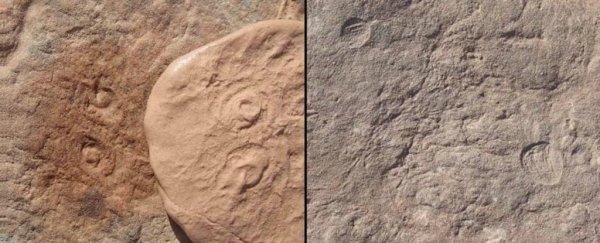Recent actions by the Trump administration - a wave of unprecedentedly large family separations at the border, aggressive trade-war-fueling tariffs and rebukes of allies - have made some feel as though the Barack Obama presidency was an unrecognizable era shrouded in an ancient past.
Perhaps, then, it is fitting that the fossil of a disc-shaped animal that lived about 550 million years ago has been christened with the name Obamus coronatus.
The name is complete with a Latin word meaning "crowned" for the wreath-like modules found imprinted on a lush seafloor that is now an arid, mountainous desert.
Another new animal discovered in a remarkably preserved fossil bed is Attenborites janeae, named in honor of the naturalist and television host David Attenborough, lead researcher Mary Droser, an Earth Sciences professor at the University of California at Riverside, said Wednesday.
While the names were chosen for both men's passion for science, Droser told The Washington Post, Obamus coronatus first reminded researchers of Obama because it resembles an ear - one of the former president's distinctive traits.
The immobile, soft-bodied creature was between 0.5 and 2 centimeters across and embedded to a mosslike carpet on the seabed.
The finding in southern Australia was a significant step in better understanding the ecosystem containing some of Earth's earliest multicellular organisms, Droser said, and will help determine where and how the creatures lived in an era before predators roamed the seas.
Droser and her colleagues have scoured the Flinders Range north of Adelaide for 20 years and have only just discovered these new creatures after suspecting they were different from other animals, calling it a "champagne moment".
Both discoveries made last year were recently announced in the Australian Journal of Earth Sciences.
It also marks yet another moment Obama has been immortalized in scientific discovery. In 2016, scientists named a parasitic worm that feeds off turtles after him.
That same year, in a surely more flattering moment, a marine biologist discovered a new kind of colorful fish, deeming it Tosanoides obama.
Attenborites janeae, shaped and grooved liked a raisin, may have floated in the ocean, Droser added. And the shapes of both are wildly distinctive.
"There is nothing like [them]. That's fun. That's really different," she said.
Droser and members of her team have worked for decades in the region, but the fossil bed has been unprecedented in its new riches.
It was dubbed 'Alice's Restaurant Bed', an homage to the Arlo Guthrie song and its refrain: "You can get anything you want at Alice's Restaurant."
It was a team effort, she stressed. Droser partnered with Jim Gehling from the South Australia Museum, along with university colleagues Peter Dzaugis and Scott Evans.
Her two children, Emily and Ian Hughes - budding scientists in their own right - also provided assistance.
Another vital person was Jane Fargher, who co-owns the property where Attenborites janeae was found and is immortalized in the name along with Attenborough.
Droser said Obama's apparent passion for science contributed to the name, but she also said she could not shake the politics of the moment.
"One can't help but feel science has been not appreciated," she said, citing policy rollbacks at the Environmental Protection Agency and Trump administration proposals to downplay the government's own climate change studies.
There is a political idea that science is a matter of opinion, not fact, she said, and she believes science was embraced by Obama.
"That feels so distant," she said, and in an ode to Obama, the naming also feels like an act of defiance.
Droser said she was leaving for Australia this week to return to the fossil bed on the hunt for other fossils.
But she insisted one thing: No new discoveries will be named after Trump.
2018 © The Washington Post
This article was originally published by The Washington Post.
